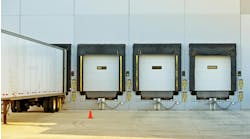You certainly hear about it frequently, to say the least: the use of data to make the business of trucking smarter. Has "Big Data" gotten so big that fleets should have people dedicated to it?
Yes, suggests fleet management system provider Geotab. Since there are a number of ways to use data to improve operations, functionalities are continually expanding and many businesses are becoming more adept at using data, you risk losing a competitive edge if you're not one of them — and putting this off could make it more difficult to catch up.
Fleet Owner heard from Colin Sutherland, executive vice president of sales and marketing at Geotab, on forming your own Big Data team and why it's important, and which fleets should be considering this.
Q: What exactly is a Big Data team? How does it function?
"Depending on the size of your business, your data team could simply be a strong relationship with a fleet management solution that 'gets' data, or a more well-defined internal team that understands how to work with key solutions to optimize your business through the use of data analytics," Sutherland says.
He notes that for smaller fleets, getting a fleet management system in place and delivering data analysis and reports to your business "is a great start." But beyond that, "it's important to have someone internally who is critically looking at the data and presenting opportunities to increase the overall profitability of your fleet," Sutherland contends.
Q: Should fleets and trucking companies — small or large — be thinking about building a Big Data team?
"Yes. The amount of data being collected and shared in today's increasingly connected world provides many opportunities to measure and improve your business," Sutherland says. "Effective use of your data can be the key to taking your fleet operations from a cost center to a profit center.
"With telematics, you have insight into customer visit times, idle times, fuel use, engine fault information and much more," he adds. "Effectively using this data helps fleets improve profitability in a variety of ways, and fleets can use vehicle data to target key areas to improve ROI."
For example, he notes, Geotab's technology lets fleets set and adjust rules around risky driver behaviors. Fleets can provide driver coaching to reduce or eliminate things like harsh braking, rapid acceleration or sharp cornering, which will increase fleet fuel economy and ultimately lower maintenance costs as well.
Q: Is Big Data a necessary business consideration today in trucking and transportation? Is it really that prominent?
"One of the biggest mistakes fleets make is underestimating the value and potential of data," says Sutherland. "You can use it to better understand your customer base, business operations and opportunities for improvement. Fleet managers can use fuel, traffic, distance and driving behavior data to identify which drivers are more efficient — and understand why they are."
Data coming from vehicles can direct driver coaching, route optimization and improved asset utilization, he notes, adding that Geotab's open platform allows further benefits of spreading data use across the organization.
"By using it in combination with other data from customer relationship management, enterprise resource planning, maintenance or other systems, your fleet and business can increase customer retention, improve profitability per delivery, reduce operating costs and achieve other goals," Sutherland says.
Q: Should businesses be worried if Big Data and having people working on this is not on their agenda?
"Fleets that aren't leveraging data to improve operations and benefit their bottom line risk getting left behind," Sutherland says. The other side of that, he adds, is that fleet management systems can help fleets get ahead.
"As an example, by gathering and analyzing vehicle diagnostic data, fleet managers have insight into the health of the vehicles within their fleet," he notes. "This allows fleet managers to improve profitability for their companies while optimizing the fleet operating budget by scheduling preventative maintenance to improve driver safety and avoid costly repairs.
"Fleet operations should not be seen as a cost to the business, but rather a profit-driver," he continues. "A comprehensive fleet management solution will help you do that."
Q: Any further suggestions for fleets in their use of data and teams working on this?
• Mix it up.
"The team looking at your data should include a variety of departments, allowing multiple skill sets to collaborate on common objectives and discover new business insights," Sutherland says. "Then you can prioritize initiatives across the organization, ultimately providing the largest benefit to your bottom line."
• Share and share alike.
"Have team members focused on understanding the data that's being collected and sharing the information in an easily digestible way by using example case studies," he recommends. "Applying data throughout your organization will make you better able to achieve goals such as minimizing fuel waste, improving driver safety and increasing vehicle uptime."



